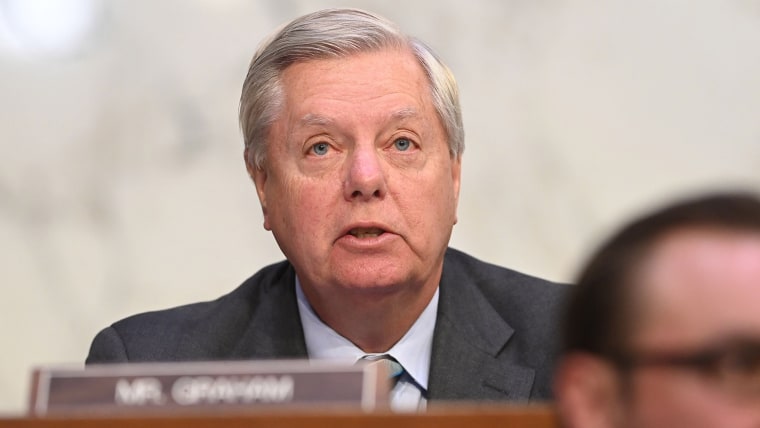“Dark money” has featured prominently in Judge Ketanji Brown Jackson’s Supreme Court affirmation hearings. But a few of these complaining loudest about dark money are uniquely accountable for the deluge of secret political spending that has corrupted U.S. politics.
On the day President Joe Biden introduced Jackson’s nomination, Senate Minority Leader Mitch McConnell declared she “was the favored choice of far-left dark-money groups.” During the primary day of Jackson’s affirmation hearings, Sen. Chuck Grassley, R-Iowa, feigned concern in regards to the “troubling role of far-left dark money groups” within the judicial choice course of.
Politicians who rail in opposition to dark money whereas refusing to help laws to scrub it up are a part of the issue.
Outside of the hearing room, Judicial Crisis Network — which pioneered dark money spending on judicial nominations — has dropped at least $2.5 million on adverts attacking the “dark money” it claims is behind Jackson’s nomination. (These assaults are largely targeted on Demand Justice, which shaped in 2018 as a liberal counterweight to JCN, however whose spending to this point has been dwarfed by that of JCN.) As The Washington Post’s Fact Checker and others have identified, it’s definitely ironic for a distinguished dark money group to critique dark money.
But the hypocrisy from Republican senators — McConnell particularly — is on one other stage: They are critiquing a system that they themselves haven’t solely labored to guard, however to assemble.
In truth, simply final yr, McConnell, Grassley and their colleagues had an opportunity to do one thing in regards to the dark money flooding judicial nominations. But as a substitute, these Republican senators used their energy to maintain dark money dark.
In 2021, the House handed the For the People Act, which, amongst many different issues, had strong provisions to shine a highlight on dark money, together with dark money spent on judicial nominations. When the invoice reached the Senate, a few of its voting rights and ethics protections had been jettisoned, however the transparency provisions remained intact.
McConnell, Grassley and each different Republican senator blocked the laws. If they hadn’t, then dark money teams like Demand Justice on the left and Judicial Crisis Network on the correct would have been required to reveal the rich donors who had given $10,000 or extra. There would’ve been little “dark money” immediately for these politicians to complain about.
McConnell’s new assault on dark money is especially cynical. He not solely blocked the laws, however expressly critiqued its anti-dark money measures and proposed an modification that may’ve stripped out the invoice’s transparency provisions, arguing that protecting rich donors secret was needed to guard “associational privacy.” When the House handed the invoice, McConnell issued a press release declaring that it “tramples on citizens’ privacy,” echoing a speaking level he has used to argue in opposition to extra donor transparency. (That’s on prime of the amicus transient he filed with the Supreme Court final yr urging it to strike down California’s charity disclosure legal guidelines.)
He made it his private mission to maintain the dark money spigot open. In a recording obtained by The New Yorker, a prime McConnell aide informed a lot of highly effective dark money teams that McConnell was “not going to back down” in his opposition to the invoice, particularly its “donor privacy” provisions.
But the recording revealed one other perception, one which may be related to the GOP’s newest messaging: Internal polling performed by one Koch-run advocacy group confirmed that ending dark money is standard with voters throughout the political spectrum. “There’s a large, very large, chunk of conservatives who are supportive of these types of efforts,” a consultant of the Koch group stated on the decision, in accordance with The New Yorker.
Given the general public’s broad, bipartisan opposition to secret political spending, McConnell and different rich particular pursuits have apparently given up on making an attempt to persuade voters that dark money truly stands for “donor privacy” and that transparency is de facto an “attack on speech.”
Instead, they’re going to cynically muddy the waters and try and confuse the general public about who’s spending dark money — and who’s working to maintain dark money dark.
The public is true to be involved about dark money. When judicial affirmation battles are dominated by thousands and thousands of {dollars} in secret political spending, the general public and lawmakers can’t know who’s making an attempt to affect them or how the rich particular pursuits who’re secretly bankrolling these campaigns might stand to profit from the Supreme Court’s opinions.
As the 2022 midterms strategy, we’re sure to see thousands and thousands extra in dark money spent by each Democrats and Republicans to affect our votes. When thousands and thousands of {dollars} in dark money are spent on elections, voters can’t know what secret donors is perhaps getting in return from the politicians they’re backing.
Candidates of all political stripes are critiquing the position of dark money in politics, however voters ought to demand extra than simply discuss. Politicians who rail in opposition to dark money whereas refusing to help laws to scrub it up are a part of the issue.



